Swiss search for strategy on nuclear
- Published
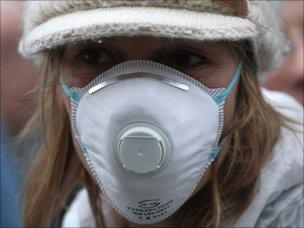
Tens of thousands of anti-nuclear protesters have demonstrated in Germany against the technology
The nuclear catastrophe in Japan has triggered a debate across Europe about just how safe nuclear power is.
The European Union has ordered stress tests on all nuclear power stations. Germany has gone a step further and taken older plants out of service.
Switzerland, though not a member of the European Union, is taking a long, hard look at its nuclear power industry too with, many Swiss believe, very good reason.
Switzerland currently gets about 40% of its energy from nuclear power, but its plants are ageing.
The Beznau 1 pressurised water reactor is the oldest in the world still in operation, it came on stream more than 40 years ago, in 1969.
The other four Swiss reactors all date from 1984 or earlier, none were built after the Chernobyl nuclear disaster of 1986, and in 1990, the Swiss, still with Chernobyl in mind, approved a moratorium on new plants.
More recently however, that policy changed, when Switzerland, concerned to reduce fossil fuel consumption, backed replacements for the oldest nuclear plants.
But that plan came to an abrupt halt early on Monday morning 14 March. After a weekend watching the unfolding disaster in Japan, Switzerland's minister for energy and the environment, Doris Leuthard, announced that all plans for new nuclear plants would be suspended.
"Safety is the highest priority for us, so I have decided to suspend these plans, until we know for certain if our own safety regulations are enough in light of these new developments," said Mrs Leuthard.
"I want to know the exact causes of the events in Japan, whether risks were underestimated, and how much this will affect our own nuclear safety regulations."

Many Europeans are turning against nuclear power
Her decision made the Swiss government the first in Europe to officially change its nuclear power policy in response to the disaster in Japan.
But doubts about Switzerland's nuclear industry are not confined to the wisdom or otherwise of building new plants. Many Swiss are extremely concerned about the safety of the existing, ageing ones.
Jurg Bueri, of the Swiss Energy Foundation, which promotes renewable energy, believes Switzerland's nuclear plants could be, in the event of an earthquake, a huge risk.
"We have been saying for years that the situation in relation to earthquakes is simply not OK," he said.
And indeed a study known as the Pegasos project, carried out by the Swiss nuclear safety inspectors long before Japan's earthquake and tsunami, revealed that, when it came to earthquake protection, Swiss plants were not up to scratch.
"In the past, it's a fact, we underestimated the risk of earthquakes," Georg Schwarz, deputy director of the Swiss Federal Nuclear Safety Inspectorate, told Swiss television.
"The new study we carried out shows that the earthquake risk in Switzerland is actually twice as big as we originally thought - that means our nuclear power stations will have to re-examine their earthquake protection measures."
Basel disaster
Switzerland, while not in a zone as earthquake-prone as Japan, does have its fair share of seismological events.
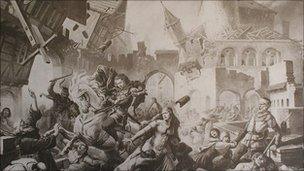
It may have been hundreds of years ago, but Basel's 1356 earthquake still triggers fear
Although most recent ones have been relatively minor, the city of Basel experienced a huge quake in 1356. The resulting destruction and subsequent fire razed the old city to the ground, and hundreds of people died. Every castle and church within a 30km radius of Basel was flattened.
Modern seismologists say that earthquake still ranks as the most significant ever to hit central Europe in recorded history: 6.5, possibly even 7, on the Richter scale.
The fault line along which it occurred is, of course, still there, and, more recently, plans for a geothermal heating plant in Basel had to be abandoned because the bore holes being drilled for it triggered off a series of tremors.
That is why safety experts are unclear that Switzerland's nuclear power stations could withstand an event like the Basel quake of 1356.
"Earthquakes are the biggest threat to nuclear power stations in Switzerland," admitted Ralph Schulz, head of safety analysis at the Nuclear Inspectorate.
"The Pegasos study did show the earthquake risks were higher than originally thought."
Nevertheless, Mr Schulz still maintains Switzerland's nuclear power plants are safe.
"We were making improvements before and after Pegasos... to improve our emergency systems, and we have made numerous improvements specific to earthquakes."
Safety delays
But new safety measures are hugely expensive: the Beznau 1 plant has spent more than 1bn Swiss francs ($1bn) on supplementary diesel generators, which would, in the event of an earthquake, cool down the fuel rods in an attempt to prevent a meltdown.
And these remedies will take years to complete, time during which opponents of nuclear power claim that Switzerland's ageing reactors would be operating below optimum safety levels.
Jurg Bueri, of the Swiss Energy Foundation, believes the money now being spent on safety measures would be better invested phasing out nuclear power.
"We need a policy that gets rid of this technology," he said. "We need to shut these old plants down and make a much stronger commitment to renewable energy."
Power dilemma
Many believe Swiss energy minister Doris Leuthard's decision to suspend all plans for new nuclear power stations was an astute bit of crisis management, in order to give her government time to develop a new policy.
Just three weeks before the Japanese earthquake, voters in the Swiss capital Berne approved - by the narrowest of margins - a new nuclear power station.
Two more referenda on new reactors in other parts of Switzerland were due soon, and Mrs Leuthard knew that after Fukushima, there was no chance of voter approval.
By suspending the plans for new reactors, she has delayed the votes by several years.
That gives her time to answer some very hard questions; investing in new safety measures for old reactors will be costly, and will likely put the price of power up - but the same is true for investing in and developing renewable energy sources.
But shutting down the reactors and losing 40% of Switzerland's energy is not a viable solution, the Swiss economy, and indeed Swiss consumers, despite their doubts about nuclear power, just would not accept it.
It is a dilemma that is facing nearly every country in Europe, as governments assess options in the wake of the Japanese disaster. What all of them know is that, after Fukushima, it will be very difficult to gain public acceptance for new nuclear power stations.
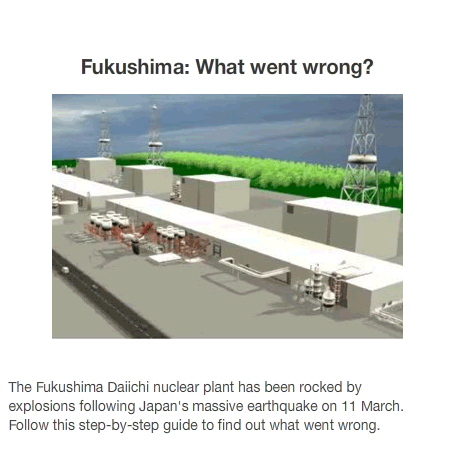
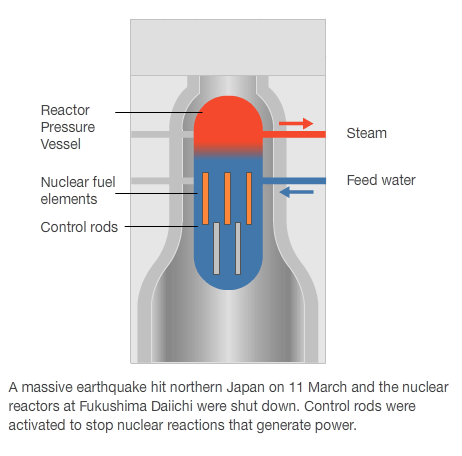
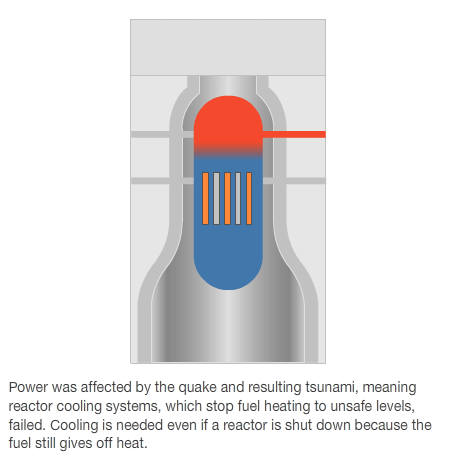
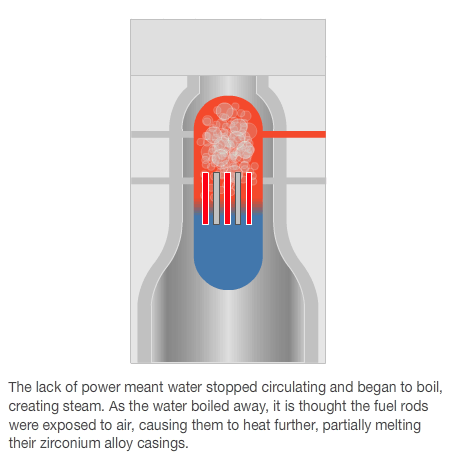
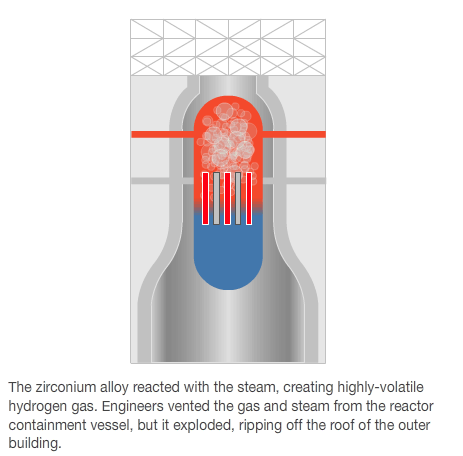
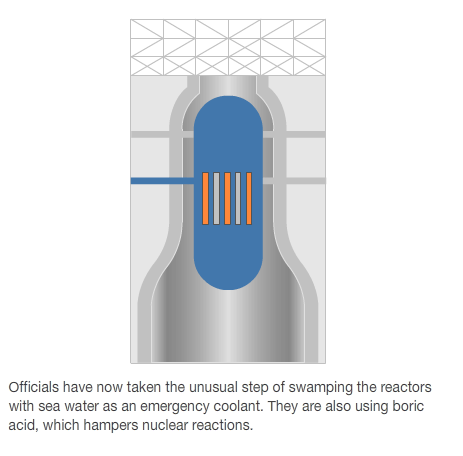
- Published12 March 2011
- Published15 March 2011